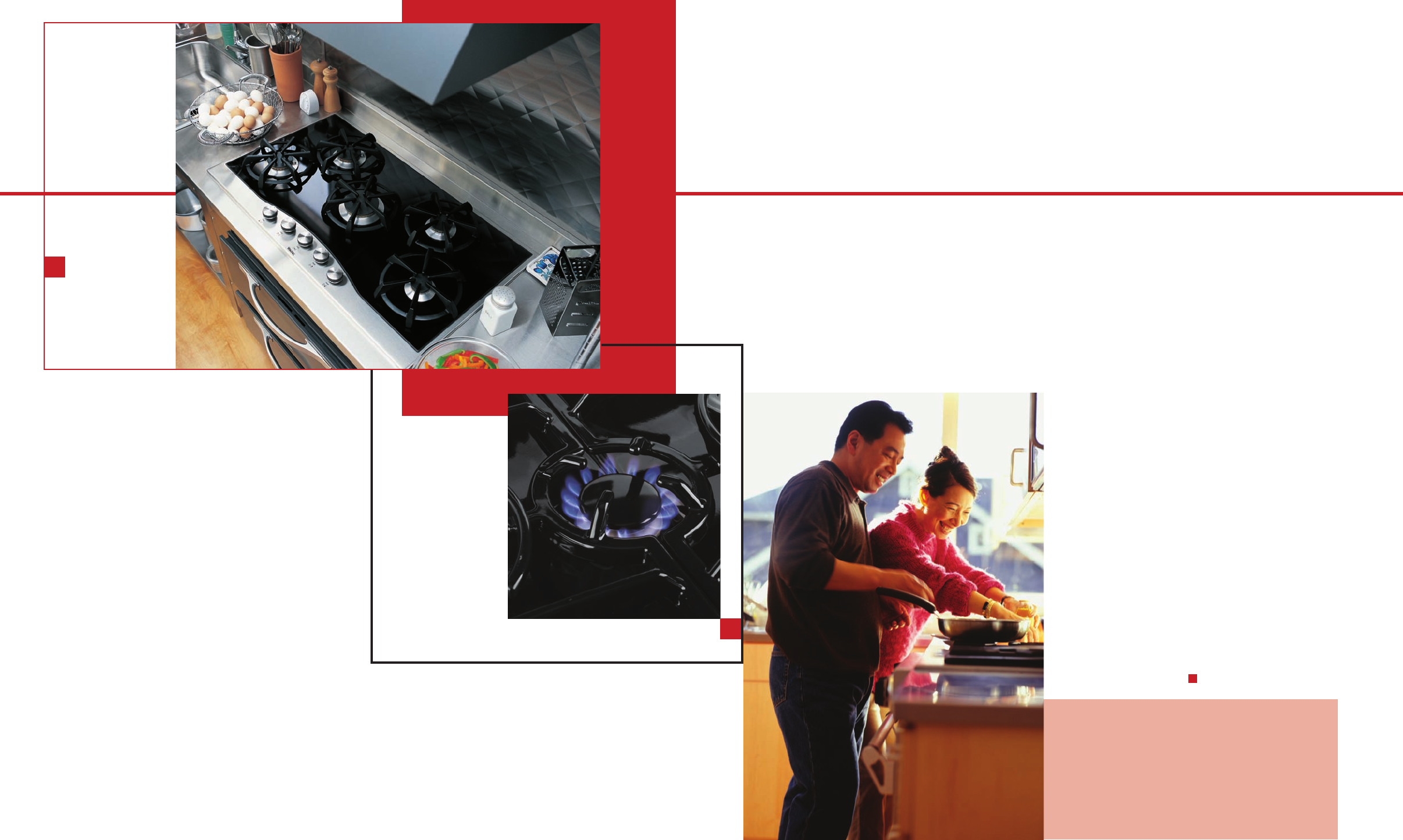
14naturalLiving ❙ Fall-Winter
naturalLiving ❙ Fall-Winter
15
is that it preheats faster, which means less time hovering over the
oven and wondering if the desired temperature has been reached.
And if you often put food in the oven while it’s preheating, gas
ovens reach baking temperature faster than electric ovens with-
out using the broiler, which could ruin food placed too close to
the broiling area.
Wide Range of Models and Styles
The most common type of gas range features four burners on top
of an oven in a single unit, but many other combinations are
available to fit the cabinetry of your kitchen, your cooking and
baking habits, and your taste. Other possibilities include a dou-
ble oven, a gas range with overhead microwave oven, slide-in
models with unfinished sides that slide between cabinets, drop-
in models installed inside base cabinets, separate oven and cook-
top that are built into the kitchen, and commercial models with
an even wider range of options.
Many homeowners are upgrading to ovens with stainless
steel or chrome-plated exteriors, which are durable, stain resist-
ant and easy to clean. However, the finishes of such units can
discolor if overheated. Porcelain enamel is the tried-and-true fin-
ish, durable and resistant to heat, stains, acids, scratches, fading
and yellowing. Baked enamel or electrostatically applied poly-
ester resists chipping better than porcelain enamel, but is less
durable, so it can stain and scratch more easily.
Of course, the style and finish of your range is important to
the overall look of the kitchen, but advances in cooktop and oven
technology have brought advanced products to the market that
can speed cooking times, warm at low temperatures and add con-
venience to the cooking process.
Convection ovens use forced air to cook foods faster at tem-
peratures 25 to 50 degrees below a conventional oven. Cooking
times and temperatures on favorite recipes will need to be
tweaked to handle convection-oven cooking, but who doesn’t
want to have dinner or enjoy a treat a little sooner? Because heat
from convection ovens enters the cooking box from the top, racks
within the oven may need to be lowered.
Low-temperature ovens feature heat ranges as low as 140 de-
grees to thaw foods and keep prepared dishes hot without drying
them out prior to serving.
Programmable ovens allow timed or delayed cooking for chefs
on the go. A cold oven can be programmed to heat up at a spec-
“Rangetop options include sealed burners to keep spilled foods from
leaking below the cooktop, and a down-draft ventilating fan built into
the cooking surface that vents through a sidewall.”
For More Information
Bosch . . . . . . . . . . . . . . .www.boschappliances.com
Fisher & Paykel Appliances Inc. www.fisherpaykel.com
General Electric . . . . . . . . . . .www.geappliances.com
Kitchenaid . . . . . . . . . . . . . . . . .www.kitchenaid.com
Maytag Customer Service . . . . . . . .www.amana.com
Maytag Customer Service . . . . . . . .www.maytag.com
Viking Range Corp. . . . . . . . . .www.vikingrange.com
Whirlpool . . . . . . . . . . . . . . . . . .www.whirlpool.com
ified time, cook for a preset number of minutes and then either
shut off or lower the temperature to a warming setting. An in-use
oven can be programmed to shut off after a set period of time.
Keeping clean is as important within the oven box as it is
in the rest of the kitchen. Ovens are available as either con-
tinuous cleaning or self-cleaning. As the name implies, con-
tinuous cleaning works at normal baking and broiling
temperatures to remove baked-on materials through the addi-
tion of catalytic materials into the porcelain enamel coating of
the oven walls or liner panels.
Operating the oven at higher temperatures will remove food
debris faster. Self-cleaning ovens work during a separate high-
heat cycle that can reach 1,000 degrees, reducing oven debris to
a white ash that can be removed with a damp cloth.
Innovative Options for the Cooktop
Innovations to gas ranges haven’t been limited to the oven. Cook-
top options can expand a cook’s repertoire, give him more
control over the cooking process and speed clean-ups. Burners
are available with heat output ratings considerably above or below
standard. Low-heat burners allow precise control to simmer foods
and prepare delicate dishes. On the other end of the scale, high-
speed burners make boiling faster and the preparation of foods in
extra-large pots and skillets easier.
Other rangetop options include sealed burners to keep
spilled foods from leaking below the cooktop and a down-draft
ventilating fan built into the cooking surface that vents through
a sidewall. This type of rangetop construction is used in mod-
els that feature such options as a rotisserie, griddle or extra set
of burners.
A gas range is a serious investment, so you should take the
time necessary to assess how you cook both on the rangetop
and in the oven, then choose a model that matches your cook-
ing style closely. A standard model may be perfect, but a pre-
mium oven could save you time and money in the long run by
offering a wider range of options. Talk to friends and neigh-
bors about their cooking experiences and how they chose the
oven for their kitchen.
Finally, judge purchase costs against operating costs. A
higher-priced gas oven may be more efficient than a lower-
priced one, which will save you money on operating costs in
the long run. Spending a little more upfront actually could pay
for itself during the long lifetime of a gas oven.
And remember, the blue flame on the rangetop burner
means that you’re in control.
A typical gas burner
can bring water to
boiling faster than
a comparable elec-
tric burner.
Photo
courtesy of Maytag.
Rangetop options
include low-heat
burners for precise
control, and high-
speed burners, which
make boiling faster.
Photo courtesy
of Viking.











